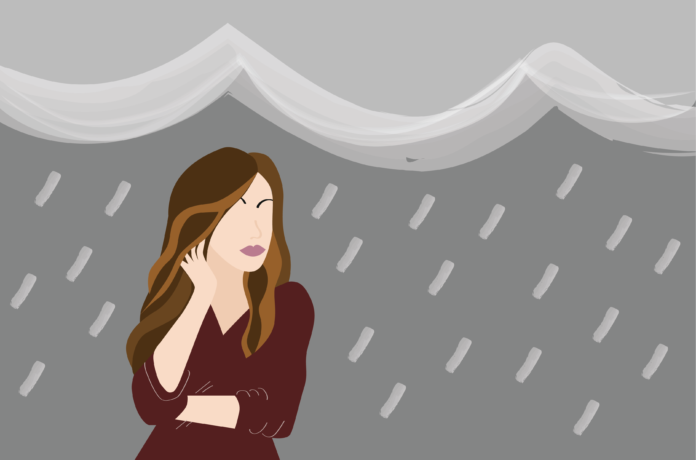Three undergrads discuss SAD symptoms, why winter impacts their mental health and tips for getting through the cold seasons
By LYRA FARRELL — features@theaggie.org
As nightfall creeps from 5 p.m. to even earlier in the afternoon and temperatures begin to fall, ushering in the chilly season, more than 5% of the U.S. population deals with another effect of winter: Seasonal Affective Disorder (SAD), or seasonal depression.
Whether it causes a slight loss in motivation and interest in socialization or is a major interference in the way an individual operates, SAD is more than just a “winter slump,” as it has been shown to have seriously debilitating effects on a person’s well-being. Three students who experience symptoms of SAD gave insight into the various ways the mental illness affects them, especially during winter quarter.
Vivian Tran, a third-year communications major, remembered that the seasonal depression she had experienced as a freshman made it difficult for her to attend classes, which is very out of her usual character.
“If the weather starts to change, if it gets colder or the sun goes down faster, it just makes me feel like more of a hermit,” Tran said. “I remember my first year at Davis; I was living in the dorms and […] would not miss a single lecture, but when it was starting to get colder, it was really hard for me to just get up and go.”
For Natalie Español, a third-year neurology, physiology and behavior major, SAD also tends to mean periods of being more withdrawn and feeling socially isolated.
“When the winter season comes, I don’t want to interact with anyone,” Español said. “But it sucks because I want to be social, but there’s a part of me that’s just like, ‘I want this day to be over.’”
On days when Español is experiencing the worst of her seasonal depression, she said she may unintentionally come across as irritable to the people around her.
“I don’t want to outwardly be mean to my roommates, but I know it comes off that way when I just put on my headphones and walk around the apartment not listening to anyone,” Español said. “I’m not trying to be mean, I’m just not in the mood.”
Joan Santos, a third-year transfer student majoring in psychology with an emphasis in biology, said that navigating the effects of SAD can be especially challenging when she is around her family.
“Typically I get more irritated, and I kind of express that anger in front of my family and then [I start] to develop that kind of self-hatred, because I have this sense of regret, like, “Why did I do that? That was stupid,’” Santos said. “During especially the winter season, it’s always just kind of anger, frustration and self-hate, and not being able to forgive myself or let others forgive me.”
In Tran’s experience, it can often feel difficult to have open discourse about the symptoms of seasonal depression because she feels that they may not be taken seriously.
“It’s hard for me to open up about it because then I feel like people kind of view it as an excuse rather than something that is an actual thing people are going through,” Tran said.
While it can be difficult to bring up symptoms of seasonal depression in everyday conversation for some, Santos has found that it’s crucial for her to set boundaries with the people around her and provide them with updates about her mental health.
“I can’t expect [others] to totally understand where I’m coming from,” Santos said. “As long as I’m clear with my communication on how I’m feeling and how I want to be treated during those moments, it’s kind of up to me.”
Santos also said that through navigating and understanding her experience with SAD, she has learned how to effectively communicate to others how the symptoms may manifest in advance.
“I’ve assessed myself so much during these situations, and tried to track and understand how I would be,” Santos said. “I would tell them really in advance, ‘Oh, this might happen, and during those times, I’d prefer it if you did not approach me right away, but let me approach you after I’ve calmed down.”
A method Tran has used to navigate her seasonal depression symptoms is to supplement her body’s vitamin D intake to compensate for the lack of sunlight in the day.
“My personal ways I’ve figured out how to deal with it so far is to get a lot of vitamin D, as much as I can,” Tran said. “Drink orange juice […], try to take multivitamins, try to help with that since you’re not really getting much sunlight,” Tran said.
Tran also said that it is important for those experiencing symptoms to allow themselves extra personal time and care this winter quarter.
“Surround yourself with friends and good vibes, good energies and just try to get yourself through that way,” Tran said. “I recommend doing a lot of creative outlets, whether that be drawing, art, maybe you like bingeing Netflix — that’s completely fine too. Just take some time for yourself.”
Written by: Lyra Farrell — features@theaggie.org
UC Davis students can schedule individual counseling sessions with the Student Health and Wellness Center by calling 1(530)752-0871. For additional on-campus resources, visit the Healthy UC Davis or Aggie Compass Basic Needs Center websites. 24-hour confidential counseling and referral information for Yolo county is available at (530)756-5000.




